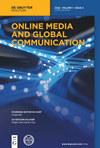A duality of belief in conspiracy theories amplification: how active communicative actions work differently by trust in the Trump and Biden administrations
引用次数: 1
Abstract
Abstract Purpose The digital setting empowers users to actively engage in communicative actions. The problem is that this active communication can increase misjudgment in determining the facts around social issues. When this communication is integrated with partisan biases, the effects can be particularly detrimental. Our study tested whether active communication actions regarding social issues and different trust levels toward presidential administrations (Trump vs. Biden) would increase belief in conspiracy theories. Design/methodology/approach To examine this, the study used online survey datasets (Amazon Mechanical Turk, N = 1355) collected during July and August 2021 concerning three political issues: the Afghanistan issue, the Black Lives Matter issue, and the Voter Fraud issue. Findings The findings show that among participants with more active communication actions, the higher Trump government trust is and the lower Biden government trust is, the more belief in conspiracy theories increases. Interestingly, interaction effects of trust in government and active communicative actions were found among both Trump and Biden supporters. Practical/Social Implications Combined with preexisting efforts to tackle misinformation online, there are extensive efforts underway to educate laypeople about the dangers of misinformation. People must understand that any person could fall into belief in conspiracy theories if they do not carefully diagnose their information behaviors. Originality/Value Our study can increase knowledge about people’s situational belief in conspiracy theories based on their political stance. The study can support future research, promoting a deeper understanding of belief in conspiracy theories.阴谋论放大的双重信念:积极的沟通行动如何因对特朗普和拜登政府的信任而不同
摘要目的数字环境使用户能够积极参与交流活动。问题是,这种积极的沟通会增加对围绕社会问题确定事实的误判。当这种沟通与党派偏见相结合时,其影响可能特别有害。我们的研究测试了关于社会问题的积极沟通行动和对总统政府的不同信任水平(特朗普与拜登)是否会增加对阴谋论的信任。设计/方法/方法为了检验这一点,该研究使用了2021年7月和8月期间收集的关于三个政治问题的在线调查数据集(Amazon Mechanical Turk,N=1355):阿富汗问题、黑人生命攸关问题和选民欺诈问题。调查结果研究结果显示,在沟通行为更积极的参与者中,特朗普政府的信任度越高,拜登政府的信任程度越低,对阴谋论的信任度就越高。有趣的是,在特朗普和拜登的支持者中都发现了对政府的信任和积极的沟通行动的互动效应。实际/社会影响结合现有的应对网上错误信息的努力,正在进行广泛的努力,教育非专业人士了解错误信息的危险。人们必须明白,如果不仔细诊断自己的信息行为,任何人都可能相信阴谋论。原创性/价值我们的研究可以增加人们对基于政治立场的阴谋论的情境信念的了解。这项研究可以支持未来的研究,促进对阴谋论信仰的更深入理解。
本文章由计算机程序翻译,如有差异,请以英文原文为准。
求助全文
约1分钟内获得全文
求助全文
来源期刊

Online Media and Global Communication
Communication, Media Studies, Internet Studies, International Studies, International Relations-
自引率
0.00%
发文量
0
期刊介绍:
Online Media and Global Communication (OMGC) is a new venue for high quality articles on theories and methods about the role of online media in global communication. This journal is sponsored by the Center for Global Public Opinion Research of China and School of Journalism and Communication, Shanghai International Studies University, China. It is published solely online in English. The journal aims to serve as an academic bridge in the research of online media and global communication between the dominating English-speaking world and the non-English speaking world that has remained mostly invisible due to language barriers. Through its structured abstracts for all research articles and uniform keyword system in the United Nations’ official six languages plus Japanese and German (Arabic, Chinese, English, French, Russian, Spanish, Japanese, and German), the journal provides a highly accessible platform to users worldwide. Its unique dual track single-blind and double-blind review system facilitates manuscript reviews with different levels of author identities. OMGC publishes review essays on the state-of-the-art in online media and global communication research in different countries and regions, original research papers on topics related online media and global communication and translated articles from non-English speaking Global South. It strives to be a leading platform for scientific exchange in online media and global communication.
For events and more, consider following us on Twitter at https://twitter.com/OMGCJOURNAL.
Topics
OMGC publishes high quality, innovative and original research on global communication especially in the use of global online media platforms such as Facebook, TikTok, YouTube, Twitter, Instagram, WhatsApp, Weibo, WeChat, Wikipedia, web sites, blogs, etc. This journal will address the contemporary concerns about the effects and operations of global digital media platforms on international relations, international public opinion, fake news and propaganda dissemination, diaspora communication, consumer behavior as well as the balance of voices in the world. Comparative research across countries are particularly welcome. Empirical research is preferred over conceptual papers.
Article Formats
In addition to the standard research article format, the Journal includes the following formats:
● One translation paper selected from Non-English Journals that with high quality as “Gems from the Global South” per issue
● One review essay on current state of research in online media and global communication in a country or region
 求助内容:
求助内容: 应助结果提醒方式:
应助结果提醒方式:


